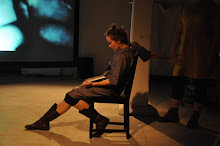Consider the following excerpt from the plot synopsis of Giasone:
Orestes, sent by Isifile to search for Giasone ... (sounds like a normal scenario so far, but keep reading) ... meets the stuttering hunchback Demo ... (stuttering hunchback? Now you're talking!) ... from whom he vainly attempts to extract information; the two then retire for liquid refreshment.
But drunk, stuttering hunchbacks are just the beginning. Giasone isn't an opera about Jason's mistreatment of the women in his life, of Medea's brutal string of murders, or her dead babies ... no, it's about all these things, and how strangely hilarious they are. There are no deaths in Giasone, but there's an attempted death, an attempted rape, one attempted suicide, and a whole lotta sex. But it's all ... pretty funny! What's the trick? Giasone begins in the world of myth, in the tabloid grotesquerie of Greek and Roman legends. But it ends in the world of opera, another narrative form whose plot structure relies on its recourse to sex, death and other upsetting events -- but one that also revels in the fact that when you try to put these things on a stage, they often end up undoing their own gruesomeness.
So in Giasone Jason nearly blows his opportunity to steal the Golden Fleece because he's perilously hung over from a wild night out with Medea. And the actual fleecing happens offstage so we can't see any of Jason's illegal activity, and it's so brief he wouldn't even have had time to go to the bathroom. He's gone! No, he's back! Even the one sad moment (Isifile's outlandishly long final rant about cold, dead breasts and babies drinking blood) is so long and so ponderous it's almost funny. Our boredom with Isifile's apparent distress is underscored by the entrance halfway through the aria of Delfa, Medea's nurse, who, having spent the entire production trying to get laid, finally wanders onstage in post-coital bliss with a martini.
If Cavalli is a hoot, Justin Way is not far behind. Like all good stage directors, he seems to find, rather than invent, his best moments right there in the music and the scenario. Delfa snorts cocaine in preparation for an aria that features wild, unpredictable tempo changes (hence the cocaine). The Argonauts, who are all but redundant in Cavalli -- they may as well not even be there, they're so underutilized -- are always trying to hide themselves on stage but doing so in the worst possible ways. Their uselessness to the opera is magnified in Way's production by the fact that they're always on stage ... with absolutely nothing to do. And more than that, they're really bad at staying out of the way. Dressed conspicuously in bowler caps and unnecessary umbrellas, they creep around attempting to blend in by crashing into main characters, curtains and baby carriages.
Another endearing Way-ism is the break-out dance. Way loves him a dancing opera singer and there are several in this production, including a large dancing countertenor in drag. Tyler Nelson, who plays Delfa, developed a drunken wobble for the role with that he uses to convey himself, wobblingly, around the stage. Demo, the stuttering (and dancing!) hunchback, has a leg length discrepancy in this production, so that he emerges at each new costume change with a newly matching giant platform shoe on his left foot. Demo, played by Julius Ahn, brought the house down. Every opera should have a drunk, stuttering, dancing hunchback.
Definitely see this opera. May 2nd is your last chance.
Subscribe to:
Post Comments (Atom)




No comments:
Post a Comment